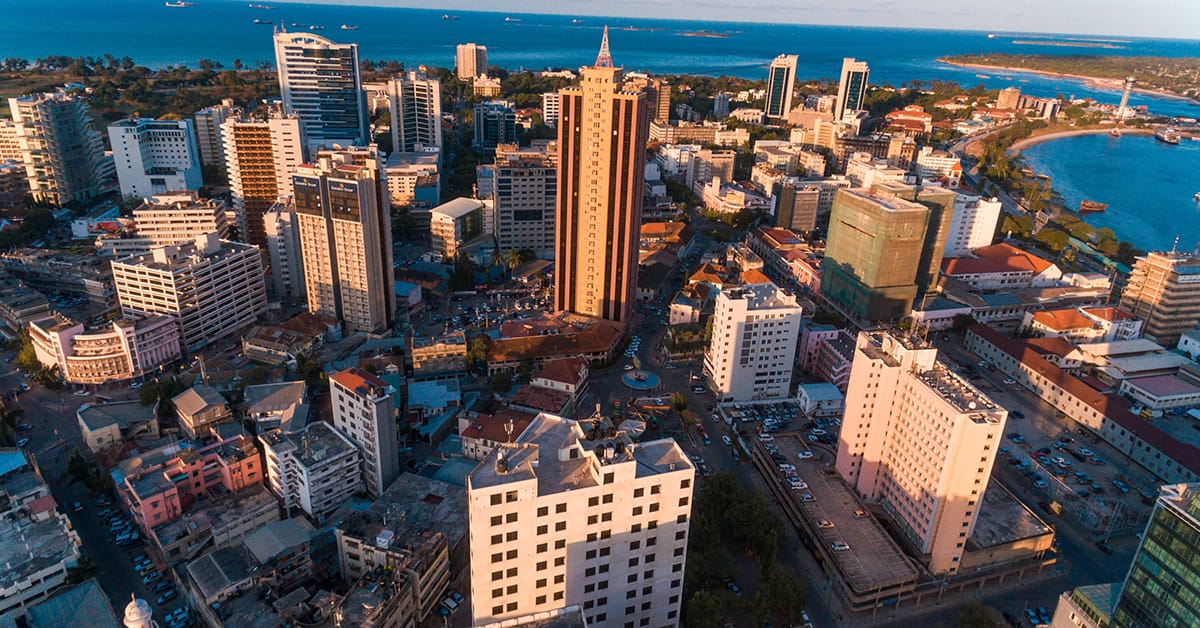Tanzania’s new leadershippreps for post-Covid economic growth.

|
VITAL STATISTICS |
|---|
|
Location: East Africa |
|
Neighbors: Mozambique; Malawi; Zambia; Democratic Republic of the Congo; Burundi; Rwanda; Uganda; Kenya |
|
Capital city: Dodoma (official); Dar es Salaam (commercial) |
|
Population (2021): 61,435,647 |
|
Official language: English; Swahili |
|
GDP per capita (2019): $1,122 |
|
GDP growth (2020): 5.8% |
|
Inflation (2019): 3.3% |
|
Currency: Tanzanian shilling |
|
Investment promotion agency: Tanzania Investment Centre |
|
Investment incentives available: No import duty on most capital goods; 10% import duty on semiprocessed goods; refunds of some excise duties; 100% capital allowance deductions in certain sectors; special economic zones |
|
Ease of Doing Business rank (2020): 141 |
|
Corruption Perceptions Index rank (2020): 94 |
|
Political risks: A new government assumed power in March 2021 with unclear priorities. |
|
Security risks: Apart from Covid-19 travel prohibitions, travelers need to avoid coming within 20 km of the border with Mozambique due to threats of terrorism and kidnapping; travelers need to avoid going within 20 km of borders with Burundi and Democratic Republic of the Congo, except for certain cities and national parks, due to armed groups, traffickers and kidnappers. |
|
PROS |
|---|
|
With some exceptions, foreign investors receive national treatment |
|
At 26.1% (2019), Tanzania has one of the lowest poverty rates in Africa |
|
CONS |
|---|
|
Foreign investment discouraged in several sectors through limitations on foreign equity ownership or other activities |
|
Child labor |
|
Currency inconvertibility |
|
Some risk of expropriation |
|
Investment-related dispute settlement can be protracted |
|
Difficulty in hiring workers |
|
Opaque tax policies |
|
Sources: African Development Bank, Associated Press, BBC, The Citizen, Government of Canada Global Travel Advisory, International Monetary Fund, Reuters, Transparency International, US Bureau of International Labor Affairs, US State Department, World Bank, World Population Review |
|
For more information, check out Global Finance‘s Tanzania Economic Report data page. |
Political stability remains one of Tanzania’s most important attributes for foreign investors, driving the nation’s economic success.
“It’s the second-biggest economy in East Africa, having grown consistently at around 6% for the last six years apart from [Covid-19] interruptions,” says Corti Paul Lakuma, a macroeconomist and research fellow at the Economic Policy Research Centre.
Tanzania offers commercial possibilities beyond its borders as well, in regional markets, according to Melissa Cook, managing director at US-based investment research firm African Sunrise Partners. “If you have an operation in Tanzania, you have a very large addressable market.”
Tanzania is a member of multiple trade organizations, including the East African Community and the African Union’s African Continental Free Trade Area (AfCFTA). The AfCFTA, which covers 1.3 billion people in 54 countries, went fully operational at the start of 2021 and intends to double intra-African trade by 2035.
“You’re not talking about single-country investments,” she added.
The country’s tourism sector has attracted hotel chains such as DoubleTree by Hilton Hotel, Four Points by Sheraton and Ramada by Wyndham. “A lot of countries are talking about tourism as a way of putting people to work and generating foreign exchange,” Cook explains. “Tanzania has a tremendous tourism infrastructure and is already considered one of the top go-to destinations.”
The nation’s consumer sector includes the beverage conglomerate Diageo, while its resources sector has the petroleum multinational Total. Due to advertisements that sought bidders for Total facilities, there were rumors in 2020 that the oil company planned to leave. But those facilities were merely excess properties that had come with Total’s 2017 acquisition of Gulf Africa Petroleum. Company officials noted at the time that the company wasn’t leaving. It had invested $200 million into its operation over the past three years.
Notwithstanding these advantages, recent government policies have raised questions concerning short- and medium-term prospects for foreign direct investment (FDI)… They also have fostered what the US State Department terms “a more challenging business environment.”
Tanzania, which first requested Covid-19 vaccine from the World Health Organization in mid-June, is one of the last countries to greenlight a Covid-19 vaccination program let alone announce its rollout. Foreigners may be able to get vaccinations through their national embassies.
The delay highlights the conflicted legacy of former President John Magufuli, who died in March of this year—from the coronavirus according to unofficial reports, which the government denies. He was one of Africa’s strongest Covid-19 deniers, discouraging the use of face masks. He argued that the country was “Covid-free,” having already rid itself of the virus through prayer, an approach that led to delays and loss of life. According to the WHO, Tanzania only had a reported 509 Covid-19 cases that led to 21 deaths up until May 2020, when the government stopped releasing data to the public.
Magufuli also was notorious with the media and political opposition; and he practiced economic nationalism, which violated many East African Community agreements and impeded FDI. However, he drove Tanzania’s progress and was the architect of the approximate6% growth, Economic Policy Research Centre’s Lakuma points out. Magufuli’s efforts made Tanzania one of the few African countries to achieve middle-income status.
Since taking power in March, President Samia Suluhu Hassan has taken a more open approach to the pandemic by encouraging research, masks, vaccinations and publication of Covid-19 data. Also, she has freed a portion of political prisoners and implemented tax incentives to boost recovery. Before making investment decisions, investors might await the results of these changes to see whether Tanzania’s earlier growth resumes.



